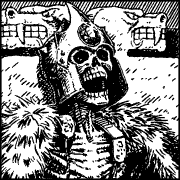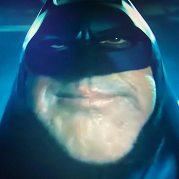|
Tiggum posted:This is inconsistent with how the system has been shown to operate in previous episodes. It does seem to be the writer's intended interpretation, but it is a problem not with the fictional computer but with the actual, real-world writing of the show. They made the rules and then they refused to engage with them. The show is dumb.
|
|
|
|

|
| # ? Apr 25, 2024 17:40 |
|
Tiggum posted:This is inconsistent with how the system has been shown to operate in previous episodes. It does seem to be the writer's intended interpretation, but it is a problem not with the fictional computer but with the actual, real-world writing of the show. They made the rules and then they refused to engage with them. The show is dumb. Not really, the point is that the determinism that Forest and the engineers embraced was a fantasy, either because they didn't have time to change their actions in the 1-second demo or because they fully embraced the philosophy of determinism. What's unclear is whether Lily choosing something different from the projections was some mystical thing that only she was capable of, or whether anyone who knew about the machine but didn't believe in determinism could do it.
|
|
|
|
SaTaMaS posted:Not really, the point is that the determinism that Forest and the engineers embraced was a fantasy, either because they didn't have time to change their actions in the 1-second demo or because they fully embraced the philosophy of determinism. What's unclear is whether Lily choosing something different from the projections was some mystical thing that only she was capable of, or whether anyone who knew about the machine but didn't believe in determinism could do it.
|
|
|
|
Strange Matter posted:And it's not even about believing in determinism as much as it's about choosing not to follow the Devs system's narrative. Lily's actions are still deterministic in that they're based on her knowledge of what the machine showed her; but the machine crashes because it cannot reconcile what it calculates as a paradox in simulating a universe where an effect precedes its cause. Those are kind of the same? The reason the machine was able to project out into the future was because all the people whose actions it was modeling either didn't know about the machine or believed that the machine's predictions were set in stone. Lily's actions may be predetermined from some omnipotent perspective of many worlds, but her choice branched out of the one future that the machine was able to project.
|
|
|
|
Strange Matter posted:How is it inconsistent? The only time we see them projecting the future is when Stanley does the one second projection for the Devs team which seems like a deliberate choice to demonstrate the ability of the system to predict the future without giving the subjects the time needed to consciously defy it. SaTaMaS posted:the point is that the determinism that Forest and the engineers embraced was a fantasy Strange Matter posted:Lily's actions are still deterministic in that they're based on her knowledge of what the machine showed her; but the machine crashes because it cannot reconcile what it calculates as a paradox in simulating a universe where an effect precedes its cause.
|
|
|
|
SaTaMaS posted:Those are kind of the same? The reason the machine was able to project out into the future was because all the people whose actions it was modeling either didn't know about the machine or believed that the machine's predictions were set in stone. Lily's actions may be predetermined from some omnipotent perspective of many worlds, but her choice branched out of the one future that the machine was able to project.
|
|
|
|
grate deceiver posted:Let's not forget that Forest straight up ordered the murder of Sergei and stood there watching, and also openly discussed eliminating other witnesses with his hitman employee. No amount of speaking softly and staring wistfully into the horizon can change the fact that he's a sociopath techbro scumbag. The show had Forrest crying after Sergei is killed because he's not a sociopath, and that just because he believes he has no free will doesn't mean that he isn't upset or lacks empathy with the killing of (rapist spy) Sergei. His whole plot revolves around him desperately trying to justify (or, at the end, sorta undo) the loss of of his family because he loves them. Katie is someone who's brain is blitzed into nihilism by the machine. Lyndon kills himself (not Katie, by your own reasoning) because he "chooses" to live in a multiverse where some variants live, and if he lives, then great, he's in a good one, because the machine has cracked his mind. Stewart... I guess is bonkers as a result of the machine, his ending really doesn't make sense but based on his attitude towards the machine if there's anyone that likely tried to beat the machine, and failed, it's him. Even Sergei is mindfucked by the machine when he grasps the implications of what it does. That's what a machine that proves hard determinism and no free will will do to most people: mindfuck them.
|
|
|
|
Tiggum posted:If the universe was not deterministic then the machine would not work. It wouldn't be able to show the future, it wouldn't be able to show the past, it wouldn't even be able to show the present. Because the whole system works by analysing the current state of some matter and working forward, backwards and out. If there are non-deterministic elements at work then its results will be inaccurate. The machine works because the universe is deterministic. That's not a theory, it's established within the show. The machine can project out into the past and future, but that's just one of innumerably many predictions. That's why Forest hates many-worlds so much, because it means that the one world that the machine can handle at once is just a drop in the bucket. The universe can still be deterministic, but the machine can't handle every branching possibility of multiple worlds.
|
|
|
|
Strange Matter posted:I think if that were the case then the machine would just continue operating but show a future that is no longer connected with the narrative that we see. It seems to me that the machine knows exactly what's going to happen and it can't process it. It knows that Lily will defect from its projection, rendering that prediction null and void and dumping the system into an unrecoverable loop. The Devs system is designed to project a fixed sequence of causality, but Lily's deviation presents it with two contradictory yet superpositoned events; if it shows her killing Forrest then she doesn't, but it it shows her keeping him alive then she does. As a consequence it's paralyzed, unable to project further in the future because, in a sort of quantum effect on the macro-scale, Lily both does and does not kill Forrest. The lift turns into a Schroedinger's box. SaTaMaS posted:The machine can project out into the past and future, but that's just one of innumerably many predictions. That's why Forest hates many-worlds so much, because it means that the one world that the machine can handle at once is just a drop in the bucket. The universe can still be deterministic, but the machine can't handle every branching possibility of multiple worlds. Zachack fucked around with this message at 16:37 on Apr 21, 2020 |
|
|
|
Tiggum posted:You don't need to consciously defy it to be affected by it! Are you deliberately ignoring the mirror analogy? Because that's the clearest way I can think of to explain this and you just aren't acknowledging it at all. As soon as they see the simulation, the simulation has affected their actions. It has changed the contents of their brain. Either the simulation has already taken that into account by simulating itself (which the show explicitly confirms is the case so I don't know why we're even stuck on this point) or it breaks. But the idea that the show is presenting is that Katie following the system's narrative is the deterministic result of her psyche. She accepts the machine's sequence of events as the absolute fact and that allows the machine to continue functioning. If she decided not to go to the dam or to pull Lyndon back from the railing, then the machine would have crashed there for the same reason that it did for Lily. But she doesn't because she believes that the events are out of her control because the system told her so. Lily proves the opposite; it is possible to defy the machine, even if that is the result of deterministic events. If you want to take it to its logical extreme, Lily was always going to defy it, which is what causes it to breakdown. The show absolutely supports a deterministic universe, but the Devs system, for all its power, still faces finite limits in what it can project. In Lily's case, the system accurately calculates that she will do the opposite of whatever the simulation shows, which is fine. The problem is that the system then has to simulate that happening, which it can't do. The same thing would have happened if they attempted the arm folding experiment, which if they were serious about it would have broken the machine right there and then. My question for you is, how do you think it should have gone?
|
|
|
|
Zachack posted:I don't think a branching universe outcome is what was depicted in the show. The show never explains how or why the machine is corrected by introducing many-worlds, only that it went from (I think) correct particle position tracking from ~90% to 100% when many-worlds is introduced. The show seemed to be saying that there are infinite universes but each one is locked; Devs universe is a predetermined universe, but there are other predetermined universes where Forrest's family doesn't die. Forrest doesn't like that because it turns out he was going Soma (and even then what he says about hellworlds doesn't make sense to me) and he wants a single universe because that means no hellworlds, and that in a single universe model he's not culpable for his family's death at all, whereas in a many-world model there are Forrests that made the right decision and Devs Forrest is living in hellworld. Those aren't mutually exclusive. A branching universe can still be predetermined. OTOH, what Forrest wants is a single tramline with no branches.
|
|
|
|
Zachack posted:I don't think a branching universe outcome is what was depicted in the show. The show never explains how or why the machine is corrected by introducing many-worlds, only that it went from (I think) correct particle position tracking from ~90% to 100% when many-worlds is introduced. The show seemed to be saying that there are infinite universes but each one is locked; Devs universe is a predetermined universe, but there are other predetermined universes where Forrest's family doesn't die. Forrest doesn't like that because it turns out he was going Soma (and even then what he says about hellworlds doesn't make sense to me) and he wants a single universe because that means no hellworlds, and that in a single universe model he's not culpable for his family's death at all, whereas in a many-world model there are Forrests that made the right decision and Devs Forrest is living in hellworld. With Many Worlds though he faces two intolerable conclusions: that he could have done something different, and that in other worlds things did go differently. Like the coin flip, the car accident is a complex event and an innumerable number of factors could have changed it. Forrest could have hung up the phone, or a squirrel could have run across the road half a mile back and delayed the car that hit his wife and kid. At the worst he's culpable, and at best he's just unlucky, both of which are outcomes he doesn't want to face. Of course their deterministic universe still makes it so that their death was within that world unavoidable, but Forrest feels damned by the idea that other worlds exist where it was avoided.
|
|
|
|
SaTaMaS posted:The machine can project out into the past and future, but that's just one of innumerably many predictions. The universe can still be deterministic, but the machine can't handle every branching possibility of multiple worlds. Strange Matter posted:But the idea that the show is presenting is that Katie following the system's narrative is the deterministic result of her psyche. She accepts the machine's sequence of events as the absolute fact and that allows the machine to continue functioning. If she decided not to go to the dam or to pull Lyndon back from the railing, then the machine would have crashed there for the same reason that it did for Lily. But she doesn't because she believes that the events are out of her control because the system told her so. Lily proves the opposite; it is possible to defy the machine, even if that is the result of deterministic events. If you want to take it to its logical extreme, Lily was always going to defy it, which is what causes it to breakdown. The show absolutely supports a deterministic universe, but the Devs system, for all its power, still faces finite limits in what it can project. Strange Matter posted:My question for you is, how do you think it should have gone? Strange Matter posted:With Many Worlds though he faces two intolerable conclusions: that he could have done something different, and that in other worlds things did go differently.
|
|
|
|
I think this argument is unresolvable if we can't agree on the interpretation of the 1-second future prediction scene. To me that scene, in its totality, clearly shows that the machine works as intended and that the world is deterministic: - It shows the machine make accurate predictions about people who are reacting to seeing the machine's predictions - The people in the scene are random unnamed Devs' programmers who are decidedly NOT true believers like Forest & Katie. Stewart and these other programmers have already deliberately 'mutinied' against them - These programmers' reaction is total shock and horror at what they're experiencing. It's not stated explicitly, but it's clear that this is intended to demonstrate that the programmers are realizing in real time that they can't defy the predictions. It doesn't LOOK like they're trying to defy the predictions, because that's a nonsense proposition in the deterministic world; their subjective feeling of defying the machine can be reduced to a mathematical expression of particle interactions, and the machine would already take this into account. If a person seeing and reacting to a prediction created an infinite loop that crashed the machine, then we wouldn't see the machine perform flawlessly here - Stewart's comments about there being "a box within a box, ad infinitum", which clearly underscores that the machine's predictions already take into account the existence of the machine and the fact that people react to its predictions - The machine being able to perfectly extrapolate the past. From the machine's 'perspective', the past and the future are both extrapolations out from the 'present' (or whatever timepoint the machine was last provided input from the real world). If human behavior contains actions that can't be explained by pure cause & effect particle interactions, then the machine would not be able to extrapolate the past perfectly, as there would be oodles of human behaviors that would be unpredictable. If your argument is that the machine can't predict what happens ONLY when a person is reacting to seeing a prediction and deciding to defy it, then this implies that what we call 'free will' exists ONLY in the context of reacting to a god-machine's predictions. If free will existed in more mundane decisions, the machine couldn't perfectly extrapolate the past. This is effectively the same as saying that Lily is 'magic' -- she is the only person in history whose behavior was unpredictable. Although as Zachack points out, the show actually depicts the machine being able to predict the future for at least a few moments after Lily's Choice™, with her crawling on the ground before dying, which again makes it unclear why the machine breaks as opposed to chugging along with an inaccurate prediction
|
|
|
|
Tiggum posted:Honestly, you eliminate almost all these issues if you don't have the simulation fail. If it just predicts something that doesn't happen then that just demonstrates the point Forrest made when Lyndon first introduced the many worlds element to it, which is that it's not simulating their universe just one potential universe. The fact that there was this event horizon it couldn't see past is the one incongruous element that breaks everything. Of course in the hands of someone less constrained by ideology it's still an immensely and wildly dangerous tool, since it can predict behavior with perfect accuracy provided that the subject is unaware of the prediction.
|
|
|
|
I keep thinking about how screwed Lily is. In the best case scenario, she's now just a character in Forrest's ideal fantasy, in the worst case scenario she's now trapped in a Black Mirror infinite torture box.
|
|
|
|
SaTaMaS posted:I keep thinking about how screwed Lily is. In the best case scenario, she's now just a character in Forrest's ideal fantasy, in the worst case scenario she's now trapped in a Black Mirror infinite torture box.
|
|
|
|
Strange Matter posted:Not really, because Forrest has no control over the content of the Many Worlds. Theoretically the good realities are just as nice for Lily as for Forrest, and there are ones were Forrest is in the weeds and Lily is living high. They aren't in the Many Worlds though, since they died. Now they're in a projection of one possible world. Forrest doesn't control the content, but Katie or whoever controls the machine does.
|
|
|
|
Strange Matter posted:This ultimately has the same end result though SaTaMaS posted:They aren't in the Many Worlds though, since they died. Now they're in a projection of one possible world. Forrest doesn't control the content, but Katie or whoever controls the machine does.
|
|
|
|
Tiggum posted:Did you even watch the show? The fact that the machine only worked properly when it was simulating many worlds is a major plot point and Forrest even reiterates it to Lily within the simulation. The world we see them in is just one of many, and happens to be a nice one for them, but there are other versions of them in much worse worlds and Forrest's decision to let them remember their own deaths is specifically so that those versions of them will know what's happening to them and why. The machine failed in the beginning when Forrest tried to force the many worlds into one single timeline, and it failed at the end when it needed to be able to fully simulate many worlds. The closest it could get was one timeline out of many possibilities. There are many possible realities that the machine can simulate, but the point is that it can't simulate all of them simultaneously.
|
|
|
|
SaTaMaS posted:The machine failed in the beginning when Forrest tried to force the many worlds into one single timeline, and it failed at the end when it needed to be able to fully simulate many worlds. The closest it could get was one timeline out of many possibilities. There are many possible realities that the machine can simulate, but the point is that it can't simulate all of them simultaneously. The machine was already capable of simulating many worlds, and in fact needed to in order for the calculations to work, because the reality of Devs is that they are living in one world out of many and the system needs to acknowledge that in order to accurately project the past and future. It just wasn't being used for that because Forrest was so focused on his world and fought to deny the existence of all others. Tiggum posted:If that were the case then it would make the inclusion of this nonsenscial element even stupider than it already is. It's not though. The machine breaking (apparently because of Lily's free will) is the impetus for a lot of what happens and in a story-telling sense completely changes the meaning of the final episode. It's clearly very important to the story they're trying to tell, it's just really dumb. The story isn't that Lily broke free from the chains of determinism, the story is that she exposes the inherent flaw of the Devs system that Katie and Forrest had been blind to because of their ideology. The fact that they didn't see it coming reveals the truth, not that they are wrong about the nature of reality, but that they are bad scientists and bad philosophers. Strange Matter fucked around with this message at 21:25 on Apr 21, 2020 |
|
|
|
Strange Matter posted:Yeah that's definitely not what happening. The final sequence shows Lily resurrected as part of the simulation. She talks to Forrest and Forrest tells her "we now live in Many Worlds. Some are paradises. Others are more like hell." And during the scene it cuts to different shots with different lighting demonstrating that they're in different simulated realities. Obviously that's not the case since reality went humming along like nothing happened when Lily threw the gun out the airlock, while the machine could no longer project anything else after that. In this case reality is many worlds, so if the machine were fully simulating many worlds there wouldn't have been an issue.
|
|
|
|
SaTaMaS posted:Obviously that's not the case since reality went humming along like nothing happened when Lily threw the gun out the airlock, while the machine could no longer project anything else after that. In this case reality is many worlds, so if the machine were fully simulating many worlds there wouldn't have been an issue.
|
|
|
|
quote:So if I tell you that my fridge used to keep things cold until one day when it stopped your conclusion is that my fridge never worked? Tiggum posted:They look different to a human because of the story we build in our minds but the universe doesn't operate on the rules of human perception. Tiggum posted:If the universe is deterministic then there is no such thing as choosing. You will do what the machine predicted because you were always going to. Martman fucked around with this message at 22:26 on Apr 21, 2020 |
|
|
|
Why does Katie need the machine to be maintained, aside from to keep an eye on Forrest and co. in a simulation of a good timeline?
|
|
|
|
Chubby Henparty posted:Why does Katie need the machine to be maintained, aside from to keep an eye on Forrest and co. in a simulation of a good timeline? She loves Forrest and feels sympathy for Lily.
|
|
|
|
The Devs system has a Map-Territory relationship to Reality. It purports to create a 1:1 simulation of reality based on deterministic principles, and largely succeeds because those principles hold true for both reality and the simulation. But just as the map is not the territory the simulation is not reality and a flaw in the simulation is not the same as a flaw with reality. Attempting to map out the future invites errors like the one that Lily exposes because the simulation, while following the same principles as reality, is bound by different physical limits than actual reality. In Reality, short of inventing time travel, it's impossible for a person to create a paradox because causality cannot be defied. Lily demonstrates that's not the case of the Devs simulation as it exists, and causes it to crash.
|
|
|
|
Strange Matter posted:I'm not saying Lily is The Special who magically used the gift of Free Will to save the day. She sees the projection and reacts accordingly. The Devs system even knows that she's going to do that, it just crashes because it creates a paradox in its simulated reality. Martman posted:One of the machine's intended functions is to predict the future. It has always been failing at doing that past Lily's choice. If a fridge is guaranteed to stop working in a week, then yeah it's quite broken. Martman posted:I don't think you can back this up. Martman posted:You keep equating "the universe is deterministic" to "the machine is always right" when the machine is 100% proven to not be always right, whether or not its universe is deterministic.
|
|
|
|
grate deceiver posted:If the machine didn't exist, would Katie's and Forrest's choices be any different morally? The fact that you know the future does not absolve you of responsibility. Responsibility and morality are entirely meaningless concepts to people without free will. Responsibility and morality require individuals who have the capacity to make choices. In a deterministic universe, not only are there no choices, there aren't really individuals either.
|
|
|
|
i think it's a mistake to see the machine as a mirror – it's a window to a simulated past and a bunch of possible futures. we also see that its projections aren't foolproof in an earlier episode, when it rewinds to show the mouse coming back to life on the table. windows are kind of used in unexpected ways throughout the series – as devices for the protagonists to get what they want in particular. lily puts a message up to tell the g.r.u. guy to gently caress off; she distracts kenton in his office; she breaks into jamie's apartment; jamie breaks her out of hospital; she distracts kenton again after he kills jamie. it feels like an intentional motif, idk: the tech guys are voyeurs who aren't willing/able to challenge what they're seeing, while lily busts on through.
|
|
|
|
|
exmarx posted:i think it's a mistake to see the machine as a mirror
|
|
|
|
Tiggum posted:It's what the show explicitly tells us. There is no other explanation for the one-second-into-the-future scene. Imagine a machine showing the predictions of a starving person who's been presented with food. You're saying that if it correctly predicts that this person eats the food, even after it shows them that prediction, this proves that their perception has no role in universal laws?
|
|
|
|
This is a dumb question but, by the rules of the show, can the machine extrapolate out into space and confirm if there are aliens flying around and stuff?
|
|
|
|
I think they have to specify the locations they're looking at, so the vastness of space would make it pretty impossible to have any reasonable chance of finding cool stuff. But yeah it should definitely let them look at other celestial bodies at least, just no one ever bothered lol
|
|
|
|
Martman posted:Sure there is. The machine is extremely good at guessing things, including the behavior of some people. But it's absolutely, 100%, definitely not perfect at guessing. Martman posted:The show explicitly shows us that Lily beats the machine. Martman posted:Imagine a machine showing the predictions of a starving person who's been presented with food. You're saying that if it correctly predicts that this person eats the food, even after it shows them that prediction, this proves that their perception has no role in universal laws?
|
|
|
|
Tenterhooks posted:This is a dumb question but, by the rules of the show, can the machine extrapolate out into space and confirm if there are aliens flying around and stuff? The machine would be hugely flawed if it couldn’t. Failing to accurately predict a deadly meteor strike would break predictions.
|
|
|
|
Tiggum posted:I know what you're saying, you're just wrong. The evidence in the show does not support your conclusion. I've explained why and you just keep ignoring me. You can choose to ignore a mirror, but only if you have seen the mirror. The existence of the mirror affects your actions even if you want to pretend that it doesn't. Devs can perfectly predict everything that a person can do, even when interacting with itself. It accurately predicts what Lily is going to do when confronted with its own simulation, and it predicts quite accurately that Lily's actions will the opposite of what its simulation shows. So it's working perfectly and as intended. The issue is that it then is being asked to simulate that event, which it can't do, because the simulation becomes recursive. If it simulates Lily shooting Forrest then she doesn't, and if it simulates her letting Forrest live then she kills him. Both events are fully deterministic and based on the predictable activity of Lily's brain. It's so predictable that you don't even need a machine to do it; I'd wager that most viewers had a pretty good idea of what she was going to do in that moment already. So the machine is left with only two options: 1. It sticks with the original projection and continues to calculate events determined by Lily shooting Forrest. In so doing it diverges from the user's reality and becomes useless. 2. Attempt to reconcile the paradox. It simulates Lily watching herself shooting Forrest, and then simulates her choosing not to shoot Forrest, which causes her to shoot Forrest in reality because Real Lily does the opposite of what Simulated Lily does. But if the machine knows that Real Lily is going to do this, and its directive is to simulate Real Lily, then it must simulate her seeing herself not shooting Forrest, which causes Simulated Lily to shoot him, therefore Real Lily doesn't. And so on, and so forth. The only way out of the loop is Option 1, which it cannot select either by design (it lacks the programming capacity to do so) or instruction (it can realize that possibility, but it has been instructed not to in order to simulate a single fixed reality instead of Many Worlds). So it crashes. The system fails because it is affected by forces that actual reality is not. Both follow physical principles of determinism, but the Devs system is also constrained by computer logic which makes this kind of error possible. I think the point you're ultimate shooting at is that the Devs system is either flawless or it doesn't work at all, because there's no such thing as an inconsequential deviation in a system where every part is dependent on the absolute behavior of every other part. Which is probably true, and it's a concession that the show has made in order to tell a story that's as much about hubris, delusion and grief as it is about speculative technology and philosophy. ghostwritingduck posted:The machine would be hugely flawed if it couldn’t. Failing to accurately predict a deadly meteor strike would break predictions.
|
|
|
|
Strange Matter posted:I think the point you're ultimate shooting at is that the Devs system is either flawless or it doesn't work at all, because there's no such thing as an inconsequential deviation in a system where every part is dependent on the absolute behavior of every other part.
|
|
|
|
Strange Matter posted:But that's not the actual problem that the machine is facing. You're describing an existential problem, when what's actually occurring is a computer science problem. Agreed on all points. We never see the machine go beyond human history or after Lily’s death so speculation about meteor strikes isn’t really necessary anyway. ghostwritingduck fucked around with this message at 17:01 on Apr 22, 2020 |
|
|
|

|
| # ? Apr 25, 2024 17:40 |
|
This might be an obvious statement, but the premise of the show is impossible in real life so the show uses flawed shortcuts to explain it to us. The idea that human beings could see into the future and still not change it is literally impossible to convey in a rational manner. Determinism is one of those things that only works as a complex mathematical demonstration or as an extremely abstract philosophical concept. My point is that claiming that any particular scene isn't logically consistent is probably a correct take but not a particularly interesting one unless you're trying to argue that inconsistency was put there on purpose for some reason. Personally, having read that Garland interview, I think he was clearly trying to argue that determinism was true and unavoidable unless you have some sort of magic quality like Lily does, which I find really unsatisfying but in the interview he says he wanted a happy ending. Forest wanted the same thing at the end so he cheats and creates a new universe with different rules, and I think Garland did the same thing.
|
|
|





















